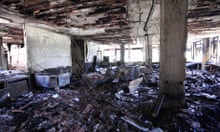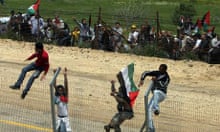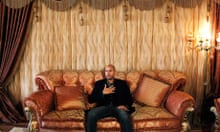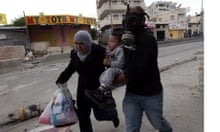Muammar Gaddafi, his son Saif al-Islam and his intelligence chief, Abdullah Senussi, were accused of crimes against humanity by the chief prosecutor for the international criminal court, who called for their arrest for orchestrating a campaign of mass murder against Libyan pro-democracy protesters.
Saif Gaddafi's indictment for committing atrocities against civilians will profoundly embarrass the wealthy and influential circle of friends he cultivated over eight years studying at the London School of Economics and living a playboy's life in Hampstead.
According to prosecution documents, his image in the west as a moderniser and reformer, often at odds with his autocratic father, was a carefully crafted sham.
A panel of three ICC judges will now decide whether to grant the arrest warrants, after which it will be left to the Libyan government to enforce them, in effect by handing over its leaders. Nato will not be asked to intervene. Even though arrests currently seem a remote possibility, Philippe Sands, a University College London professor who is writing a book on the making of international law, said the indictment of Saif broke new ground.
"This is a new direction for the ICC in the sense that an individual closely associated with the establishment in many western countries now finds himself the subject of an indictment," Sands said.
The ICC chief prosecutor, Luis Moreno-Ocampo, said that Saif played a central role in the machinery of state repression. He was the "de facto prime minister", with control of regime finances. He is also alleged to have taken "an active role in the recruitment of foreign mercenaries".
According to the charges, Muammar Gaddafi held a series of meetings in mid-February with Saif and Senussi, the head of military intelligence and brother-in-law of the Libyan leader, described by Moreno-Ocampo as his "right-hand man, the executioner".
This "inner circle" convened, as the Arab Spring democracy movement threatened to take off in Libya, to plan the crushing of the protests through the use of snipers, machine guns and heavy weapons. Moreno-Ocampo said his investigators had uncovered "direct evidence" of the three men committing the crimes.
The three each face charges of crimes against humanity, not only for murder but also political persecution through mass arrests and torture.
"Methods used to torture alleged dissidents have included tying electric wires around victims' genitals and shocking them with electricity and whipping victims with an electric wire after tying them upside down with a rope connected to a stick," the prosecutors say in their application for the arrest warrants.
The document notes Gaddafi has challenged his critics to produce the bodies of those killed by the regime, but the prosecutors say: "Cemeteries and burial sites have been destroyed and bodies dug up, loaded on trucks and taken away."
The Libyan government shrugged off the charges. "We believe that the ICC has no jurisdiction on these issues," the deputy foreign minister, Khaled al-Khiam, said. "We see the international criminal court as targeting African states."
In his remarks, Moreno-Ocampo singled out Interpol for praise. According to officials at the prosecutor's office, the agency kept the prosecutors informed when potential witnesses of crimes against humanity in Libya fled the country, helping investigators to track them down and interview them.
The investigators also pored over mobile phone records and internet communications, potentially a source of huge discomfort for Saif's friends in the UK. "His address book is going to be bulging with significant contacts. The question is going to be how long those contacts stayed in touch and at what point they cut him off," a source familiar with the investigation said.
Saif's indictment will deepen the already considerable embarrassment of the London School of Economics, where Saif studied for six years. The LSE accepted a £1.5m donation from a foundation he controlled to fund a north African research programme. Of that total, £300,000 was spent before the programme was suspended.
The LSE was far from alone in viewing Gaddafi's urbane second son as a sign that Libya was set for change. Western diplomats saw him as a reformer with whom it was possible to do business, and western governments kept up contacts with him after the fighting began in Libya, hoping he could be a conduit for a peace deal.
Moreno-Ocampo alleges that much of Saif's moderate gloss was a sham. "Evidence shows that the purported 'fallouts' with Gaddafi are staged to bolster Saif al-Islam's image as the modern successor of his father," the indictment alleges.
Richard Dicker, director of the international justice programme at Human Rights Watch, said: "The prosecutor's announcement is a warning bell to others in Libya that serious crimes there will be punished. While it's up to the judges to weigh the evidence and decide, the request for an arrest warrant for Muammar Gaddafi is a remarkable development for victims in Libya, the ICC and justice more broadly."
Critics have argued that such indictments are an obstacle to peace because they make it harder to propose exile as a way out for the Gaddafi clan. Sands argued that the indictments did not necessarily make a peace deal in Libya less likely: "Although it takes Saif Gaddafi out of any possible resolution, it will increase pressure on others to sort this out sooner rather than later, before they too are indicted."






